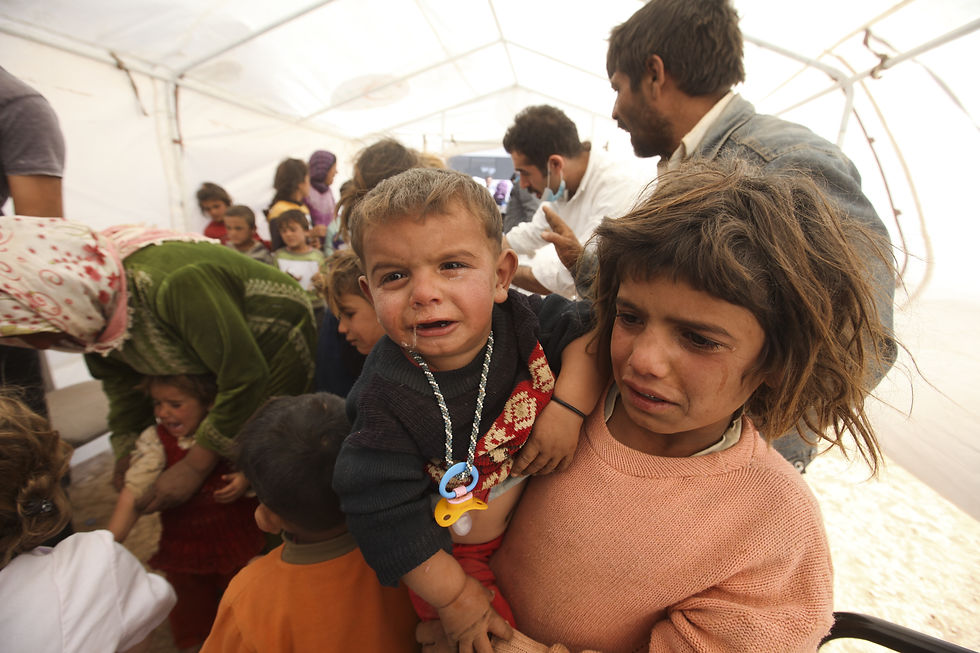The Ongoing Problem of Kurdish Demographics Across the Middle East
- Hannah Reim
- Jan 27
- 4 min read
The Kurds are one of the largest stateless ethnic groups in the world, with an approximate population between 40 and 60 million spread across four major nations in the Middle East. Such substantial demographic ambiguity is deliberate, a consequence of their host countries marginalizing and disempowering a prominent minority within their borders. Here we examine how the population data is manipulated, and provide best estimates.

Cultural and Political Oppression
Forced assimilation of the Kurdish people, the renaming of Kurdish regions, and discouraging use of the Kurdish language are all facilitated by deliberately under-estimating population figures. The manipulation and obfuscation of Kurdish demographic data – while over-estimating and empowering opposition groups – helps suppress Kurdish identity and political power, weakening their influence and sovereignty.
Lack of Official Designation
An all-too-easy way of distorting Kurdish demographics is through census questions which fail to specify ethnic identity, or classify Kurds under a broader national label, making them essentially vanish. Many countries in the region don’t even collect such demographic data, or refuse to publicly release it, or both. This absence of official, transparent census figures leads to widely varying estimates of Kurdish populations.
Wars and Refugees
Forced migrations, internal displacement, and refugee tsunamis have become a sadly routine part of Middle East history. Large scale population shifts have completely altered the maps in Iraq and Syria, for example, where oppressive and opaque dictators have fallen only to usher in eras of civil war. Amid the chaos the Kurds have survived, but in a manner and to an extent that remains demographically ambiguous and uncertain.

Internal Diversity and Fragmentation
A clear demographic analysis of the Kurdish people is even more challenging since “Kurdistan” is a patchwork of tribal structures, dialects, and cultures that are spread across Turkey, Syria, Iraq, and Iran. Further complicating matters, Kurds may identify strongly with smaller groups or tribes within these broader national regions, making a precise census revealing all Kurdish details highly complicated and confusing.
Kurdish Jigsaw Puzzle
The overall result is that overall estimates of the Kurdish population must be treated with skepticism. A combination of government data, historical records, satellite analysis, and ethnographic research are combined to provide a range, and characterize various aspects of the Kurdish demographic in a meaningful and accurate way. Let’s take a look at the best data available for each country to try and gain some clarity of the bigger picture.
Kurds in Turkey
Turkey has the largest Kurdish population in the Middle East, estimated between 12 and 15 million, accounting for roughly 15 to 20 percent of the total Turkish population. Their highest concentration is in the southeastern provinces—such as Diyarbakır, Van, Şırnak, and Hakkâri. Despite the many ongoing challenges between the Turks and the Kurdish people, major cities such as Istanbul, Ankara, and Izmir host millions of Kurds.
Kurds in Iraq
Iraqi Kurds number approximately 5 to 7 million, roughly 15 to 20 percent of overall population. The majority live in the northern Kurdistan Region of Iraq (KRI), composed of the governorates of Erbil, Sulaymaniyah, and Duhok. Kurdish communities are also found in disputed territories including Kirkuk, Diyala, and parts of Nineveh, where complex demographic realities and fights over administrative control continue.
Following the toppling of Saddam Hussein, the Kurdistan Regional Government (KRG) has exercised considerable self-governance with its own parliament, security forces, and educational systems. This arrangement has allowed Iraqi Kurds to enjoy a level of autonomy unrivaled by other Kurdish communities in the Middle East, but internal conflicts continue as the Iraqi government becomes increasingly influenced by Iran.
Kurds in Iran
Second only to Turkey, Iran is believed to have the largest Kurdish population, with estimates ranging from 7 to 10 million. Mostly living in the northwest of the country, Iranian Kurds reside in provinces such as Kurdistan (Kordestān), Kermanshah, West Azerbaijan, and Ilam. Although they make up roughly 10 percent of Iran’s total population, demographics within Iran are particularly difficult to confirm.
Kurds in Syria
With a population between 1.5 and 2 million, the Kurds remain the largest ethnic minority in the country. Most Syrian Kurds live in the northeastern region—referred to by Kurds as Rojava—and in smaller pockets around Aleppo and Damascus. Throughout the civil war, Syrian Kurds carved out semi-autonomous regions in parts of Hasakah, Raqqa, and Aleppo provinces. Assad recently fallen, the fate of the Syrian Kurds is in limbo.
Kurdish Cultural and Religious Diversity
Further complicating Kurdish demographics is the complex mosaic of culture and religion across “Kurdistan”. The Kurdish language is divided into multiple dialects—primarily Kurmanji, Sorani, and to a lesser extent Pehlewani and Zazaki. The majority of Kurds are Sunni Muslims, but many belong to various other Islamic sects, including Yazidi, Alevi, and Christian Kurdish communities throughout the area.
Kurdish Diaspora
Several million Kurds live in communities outside the Middle East and around the world, the most found in Germany, France, Sweden, and the United Kingdom, with others in North America, Australia, and in the post-Soviet states. Kurdish advocacy organizations serve as sources of cultural expression, with festivals, language studies, and political discussions that reinforce a global sense of Kurdish identity and purpose.


Comments